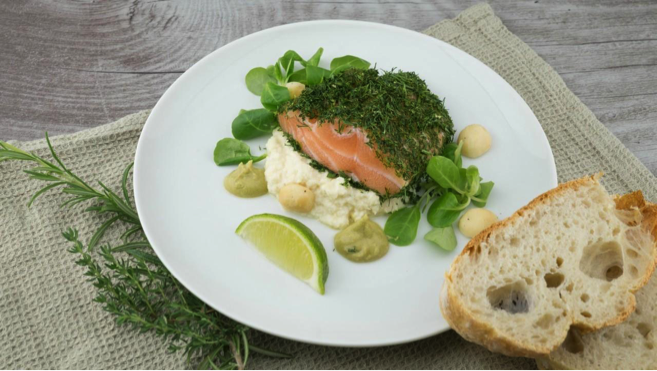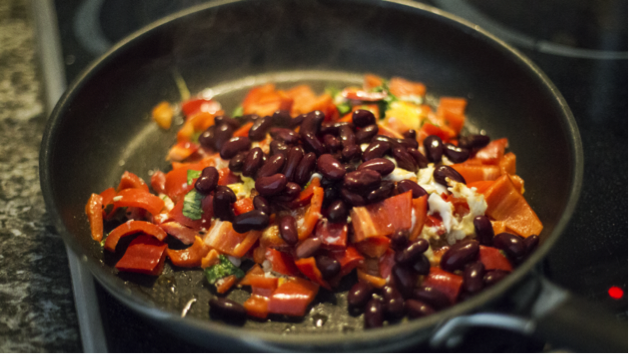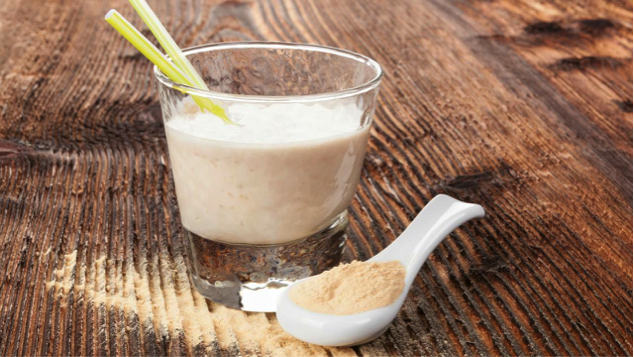
Early on in our relationship, I fed my partner a nutrient-dense dinner. As an avid cook, I loved the nuances of food.
“What was in it?” I asked him. “Can you tell?”
His mouth full, he swallowed and said, “Don’t know, don’t care.”
As I have gotten to know him better over the years, I realized that his response had less to do with insensitivity than it did with his quest for the delicious. I can stuff nutritional yeast and chia seeds and other nutrient-rich ingredients into my dishes, and as long as they taste good, he is happy.
All people are primal about what foods they choose to eat and not eat. It can feel very personal when somebody suggests that we cut a particular food out of our diet, or start adding more “leafy greens.”
Even as someone who loves leafy greens, I have to admit that the concept of them doesn’t sell well.
Although men can father children much longer than women can biologically mother them, the quality of their sperm does start to decrease around the age of 35. (Sorry, guys).1
This doesn’t mean that we can’t improve things with a firmer commitment to nutrition. After all, the phrase, “You are what you eat,” can also apply to sperm.
Here are five foods that may help things — er — keep swimming along.
1) Seafood

There have been numerous studies noting that fertile men have a higher quality of omega-3 essential fatty acids in both their sperm and their blood.
Omega-3s help with the sperm’s fluidity, and having seafood two or three times a week is recommended. Fish oil capsules with both EPA and DHA fatty acids are beneficial supplements to your diet.2, 5
2) Beans

In a small Netherlands study, the effects of zinc sulfate and folic acid on a group of men with reduced fertility were remarkable. The men experienced a significant increase by 74 percent of normal sperm count after receiving treatments for 26 weeks.
Both zinc and folic acid are essential for cell division and forming DNA. Add some chickpeas or other beans to your regular diet to provide an easy boost for the two of you.3
3) Berries

In many studies, antioxidant supplementation improved the number, motility, morphology and even the DNA integrity of the sperm.
Foods high in antioxidants include goji berries, blueberries, other berries and dark chocolate. (I’m aware that chocolate isn’t a berry, but I am glad to justify my relationship with it.)4
4) Bell Peppers

On the subject of antioxidants, vitamin C supplements have been found in studies to positively affect sperm count.6 Along with the obvious oranges, peppers are an excellent source, and are easily thrown into a stir-fry or pasta dish. Just ½ cup of chopped bell pepper has you covered, where your C-count is concerned, for the day.
5) Maca Root

On the list of ingredients that didn’t used to be in grocery stories is Peru’s maca root. Authority Nutrition reports that “several studies in men have shown that taking 1.5-3 grams of dried maca root for three months” may improve libido, erectile function and sperm count.6
The evidence showing a benefit was not found to be strong but it can’t hurt to throw some into your guy’s daily smoothie if you are trying to get frisky (with purpose). Check health food stores for the dried form.
If the foods aren’t working, there’s another possible way to boost your fertility. That’s with the use of a product like Stork OTC which uses cervical cap technology. It’s always good to have a multi-dimensional plan.
1) Bronte A. Stone et. Al. Age thresholds for changes in semen parametres in men. American Society for Reproductive Medicine. Elsevier. October 2013Volume 100, Issue 4, Pages 952–958.
http://www.fertstert.org/article/S0015-0282(13)00687-0/abstract
2) Attaman JA et al. Dietary fat and semen quality among men attending a fertility clinic. Hum Reprod. 2012 May;27(5):1466-74. doi: 10.1093/humrep/des065. Epub 2012 Mar 13.
https://www.ncbi.nlm.nih.gov/pubmed/?term=Attaman+et+al.+Hum+Reprod+2012
3) Wong, WI et al. Effects of folic acid and zinc sulfate on male factor subfertility: a double-blind, randomized, placebo-controlled trial. Fertil Steril. 2002 Mar;77(3):491-8.
https://www.ncbi.nlm.nih.gov/pubmed/11872201
4) Ahmadi, S et al. Antioxidant supplements and semen parameters: an evidence-based review. Int J Reprod Biomed (Yazd). 2016 Dec;14(12):729-736. https://www.ncbi.nlm.nih.gov/pubmed/28066832
5) Food for Male Fertility? Dr. Weil. Retrieved 21 February 2017.
https://www.drweil.com/health-wellness/health-centers/men/food-for-male-fertility
<!-- /* Font Definitions */ @font-face {font-family:Cambria; panose-1:2 4 5 3 5 4 6 3 2 4; mso-font-charset:0; mso-generic-font-family:auto; mso-font-pitch:variable; mso-font-signature:-536870145 1073743103 0 0 415 0;} /* Style Definitions */ p.MsoNormal, li.MsoNormal, div.MsoNormal {mso-style-unhide:no; mso-style-parent:""; margin:0in; margin-bottom:.0001pt; mso-pagination:none; font-size:12.0pt; font-family:Cambria; mso-fareast-font-family:Cambria; mso-bidi-font-family:Cambria; color:black;} .MsoChpDefault {mso-style-type:export-only; mso-default-props:yes; font-family:Cambria; mso-ascii-font-family:Cambria; mso-fareast-font-family:Cambria; mso-hansi-font-family:Cambria; mso-bidi-font-family:Cambria; color:black;} .MsoPapDefault {mso-style-type:export-only; mso-pagination:none;} @page WordSection1 {size:8.5in 11.0in; margin:1.0in 1.25in 1.0in 1.25in; mso-header-margin:.5in; mso-footer-margin:.5in; mso-paper-source:0;} div.WordSection1 {page:WordSection1;} -->
6) 10 Ways To Boost Male Fertility and Increase Sperm Count. Authority Nutrition. Retrieved 21 February 2017.
https://authoritynutrition.com/boost-male-fertility-sperm-count





Add a CommentComments
There are no comments yet. Be the first one and get the conversation started!